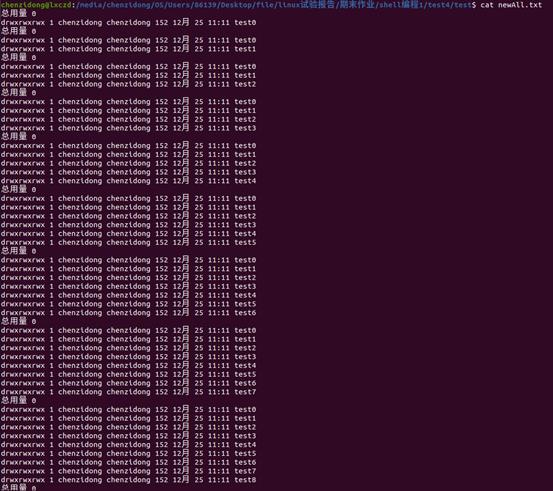linux利用shell脚本下载文件并解压
Posted
tags:
篇首语:本文由小常识网(cha138.com)小编为大家整理,主要介绍了linux利用shell脚本下载文件并解压相关的知识,希望对你有一定的参考价值。
参考技术A 新建shell脚本文件:输入以下内容:
使用示例:
Ubuntu-Shell编程大作业
文章目录
实验一:利用数据生成程序熟练掌握Shell脚本对文件夹的批处理
1.benchmark为一个可执行文件,用于生成我们需要的数据集,运行该文件的命令为./benchmark。
该程序可执行文件的输入文件为该文件所在目录下的parameters.dat,输出文件为statistics.dat,comunity.dat,network.dat,且该程序每次运行生成的数据集不同。
2.parameters.dat中包含的参数为number, averagePower, maxPower, moreno, morenO, mix,max, min,存放格式如parameters.dat所示。
3.现我们需要写一个脚本,完成如下工作。
(1)生成parameters.dat文件,用写入的方式将参数写入该文件。
(2)在相同参数下运行benchmark文件10次,并根据参数和次数新建文件夹,文件夹名字如:1000_10_30_2_1_0.3_3_16_10,最后的数字代表第多少次生成。
(3)每次产生输出文件时将三个输出文件存储在不同的文件夹,并删除该次的参数存放文件:parameters.dat文件。
#!/bin/bash
#test1.sh
#将parameter.dat.txt数据写入文件parameter.dat,并运行benchmark10次,新建文件夹,并输出,然后删除parameters.dat文件。
#创建文件parameter.dat
touch parameters.dat
#将parameter.dat.txt的内容复制到parameter.dat中
cat parameters.dat.txt>>parameters.dat
for((i=1;i<=10;i++))
do
`./benchmark`
`mkdir 1000_10_30_2_1_0_0.3_3_16_$i`
`mv ./statistics.dat 1000_10_30_2_1_0_0.3_3_16_$i/statistics.dat`
`mv ./community.dat 1000_10_30_2_1_0_0.3_3_16_$i/community.dat`
`mv ./network.dat 1000_10_30_2_1_0_0.3_3_16_$i/network.dat`
done
rm -rf parameters.dat
运行截图



实验二:在Linux环境下编写一个压缩和解压缩的小工具
要求:压缩的时候可以由用户输入密码,解压缩的时候需要提供密码才能解压缩。
#!/bin/bash
#test2.sh
#encode to zip or unzip file
echo -e '1.zip flle\\n2.unzip file\\n'
read choice
case $choice in
1)
echo "please input the filename:"
read filename
echo "please input the zip code"
read password
`zip -rP $password $filename.zip $filename`
echo "zip successfully";;
2)
echo "please input the filename"
read filename
echo "please input the zip code"
read password
`unzip -P $password $filename`
echo "unzip successfully";;
esac
运行截图:




实验三:在Linux下利用case语句编写脚本,实现建立用户和删除用户的功能,过ssh连接到IP主机并保持登录的功能。
实验第一部分实现的功能为:
1.执行create时根据userfile和passfile建立用户。
2.执行delete时根据userfile删除用户。
实验第二部分实现的功能为:
1.执行:/mnt/auto_connect.exp IP password 时保证密码正确,那么就通过 ssh 连接到该 IP 主机,并保持登陆。
第一部分代码:
#!/bin/bash
#test3.sh
#create user and delete user
echo -e "please input userfilename:"
read userfile
echo -e "please input the passfile"
read passfile
echo -e "create:create new users by $userfile and $passfile\\ndelete:delete all users by $userfile"
read choice
export username
case $choice in
'create')
if [ ! -e $userfile ] || [ ! -e $passfile ]
then
echo "$userfile of $passfile do not exist"
exit 1
fi
#user number
line1=`cat $userfile|wc -l`
#passwd number
line2=`cat $passfile|wc -l`
#judge the user number and passwd number
echo "line1:$line1"
echo "line2:$line2"
if [ $line1 -ne $line2 ]
then
echo "user number is not equal with passwd number"
exit 1
fi
#read userfile
for((i=1;i<=3;i++))
do
read username[i]
`sudo useradd $username[i]`
done<$userfile
#read passwdfile
for((i=1;i<=3;i++))
do
read password[i]
`echo $username[i]:$password[i] | sudo chpasswd`
echo "$username[i]用户创建成功"
done<$passfile;;
'delete')
if [ -e $suerfile ]
then
echo "deleting"
else
echo "file do not exist"
exit 1
fi
for((i=1;i<=3;i++))
do
read username
echo "$username用户删除成功"
`sudo userdel $username`
done<$userfile;;
esac
echo "successfully"
第二部分代码:
需要主机配置ssh环境
#!/bin/bash
#test3_plus.sh
#于主机建立ssh连接
/usr/bin/expect << EOF
spawn ssh root@$1
expect
"yes/no" send "yes\\r";exp_continue
"password" send "$2\\r"
interact
EOF
运行截图:
第一部分:




第二部分截图:

实验四:在Linux下实现一个文件及文件夹操作的Shell脚本
1.新建一个test文件夹,在下面新建10文件夹,每一个文件夹下新建一个txt文件,并写入内容。
2.获取目录下所有文件的文件名。(包括路径)
3.将test文件夹下10个文件夹下的文件复制到test文件夹下的data文件夹中,将data文件夹中所有文件重定向到一个新的文件中。
cd `dirname $0`
mkdir test
cd $PWD/test
#打印当前路径
echo $PWD
for((i=0;i<10;i++))
do
#新建文件夹
eval "mkdir" "test$i"
#新建文件
touch test$i/new$i.txt
#写入内容
ls -l>test$i/new$i.txt
done
touch filenames.txt
for((i=0;i<10;i++))
do
#进入目标文件夹
cd test$i
#将当前路径写入filenames.txt
echo ”$PWD”>>../filenames.txt
#返回上级目录
cd ..
done
mkdir data
for((i=0;i<10;i++))
do
#移动文件夹
mv test$i/new$i.txt data
`cat data/new$i.txt>>newAll.txt`
done
#返回上级目录
cd ..







以上是关于linux利用shell脚本下载文件并解压的主要内容,如果未能解决你的问题,请参考以下文章
Java利用 ganymed-ssh2-build.jar来上传文件到linux以及下载linux文件以及执行linux shell命令
如何直接用linux shell命令从windows下载文件?